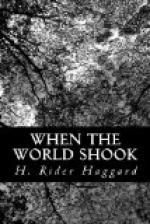When we were clear of the palace, of which we had only seen one hall, we walked across an open space made unutterably dreary by the absence of any vegetation or other sign of life, towards a huge building of glorious proportions that was constructed of black stone or marble. It is impossible for me to give any idea of the frightful solemnity of this doomed edifice, for as I think I have said, it alone had a roof, standing there in the midst of that brilliant, unvarying and most unnatural illumination which came from nowhere and yet was everywhere. Thus, when one lifted a foot, there it was between the sole of the boot and the floor, or to express it better, the boot threw no shadow. I think this absence of shadows was perhaps the most terrifying circumstance connected with that universal and pervading light. Through it we walked on to the temple. We passed three courts, pillared all of them, and came to the building which was larger than St. Paul’s in London. We entered through huge doors which still stood open, and presently found ourselves beneath the towering dome. There were no windows, why should there be in a place that was full of light? There was no ornamentation, there was nothing except black walls. And yet the general effect was magnificent in its majestic grace.
“In this place,” said Yva, and her sweet voice went whispering round the walls and the arching dome, “were buried the Kings of the Sons of Wisdom. They lie beneath, each in his sepulchre. Its entrance is yonder,” and she pointed to what seemed to be a chapel on the right. “Would you wish to see them?”
“Somehow I don’t care to,” said Bastin. “The place is dreary enough as it is without the company of a lot of dead kings.”
“I should like to dissect one of them, but I suppose that would not be allowed,” said Bickley.
“No,” she answered. “I think that the Lord Oro would not wish you to cut up his forefathers.”
“When you and he went to sleep, why did you not choose the family vault?” asked Bastin.
“Would you have found us there?” she queried by way of answer. Then, understanding that the invitation was refused by general consent, though personally I should have liked to accept it, and have never ceased regretting that I did not, she moved towards a colossal object which stood beneath the centre of the dome.
On a stepped base, not very different from that in the cave but much larger, sat a figure, draped in a cloak on which was graved a number of stars, doubtless to symbolise the heavens. The fastening of the cloak was shaped like the crescent moon, and the foot-stool on which rested the figure’s feet was fashioned to suggest the orb of the sun. This was of gold or some such metal, the only spot of brightness in all that temple. It was impossible to say whether the figure were male or female, for the cloak falling in long, straight folds hid its outlines. Nor did the head tell us, for the hair also was hidden




